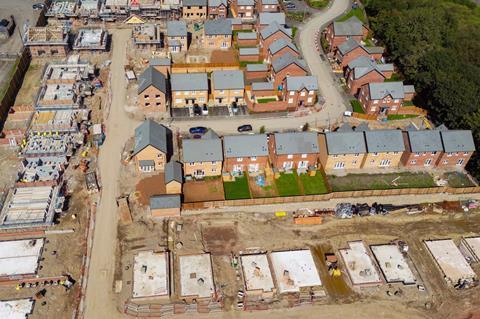Bellway’s profit has been dented by costs relating to structural defects at a high-rise residential scheme in south-east London.
Preliminary results for the year to July detailed the costs of a defective reinforced concrete frame at a historic scheme in Greenwich, which was first identified in the previous financial year.
The housebuilder has set the current provision for the cost of remediation work at £45.6m and expects the cash outflow to be over the next three years.

Bellway said it expects volumes to increase next year
For the most recent financial year, Bellway set aside an exceptional pre-tax expense of £15.3m relating to the defect, of which £14.1m was recognised in cost of sales.
Bellway said the “scope and extent of the required works” had increased during the year as the remediation design and strategy evolved.
It said it had reviewed other buildings where the same third parties responsible for the design of the frame in the Greenwich development had been involved and found “no other similar design issues with reinforced concrete frames”.
“We are actively seeking recoveries in relation to the structural defect identified, but as these are not virtually certain at the balance sheet date, no reimbursement assets have been recognised,” it added.
The expense contributed to a total £37m in legacy building safety costs, which hit the housebuilder’s pre-tax profit for the year.
Profit before tax stood at £183.7m, down 62% from £483m.
It said site profitability decreased in line with expectations, ”arising from cost inflation and the use of sales incentives, together with higher site-based overheads due to the generally slower sales market since the summer of 2022.”
The profit figure was also impacted by £5.4m in aborted transaction costs related to its move to buy rival builder Crest Nicholson.
An offer proposed on 3 July would have seen Crest Nicholson’s shareholders receive 0.099 shares in Bellway for each share they own in Crest Nicholson.
Despite saying its plan to take over its smaller rival would deliver operational benefits, the larger business announced in the middle of August that it was backing away from the plan.
>>See also: A tale of two mergers: What do the completion of Barratt-Redrow and the collapse of Bellway-Crest Nicholson mean for Labour’s housebuilding plans?
>>See also: Top 50 Housebuilders 2023
Even without these exceptional costs, pre-tax profit would have been down 57.5% according to the firm.
Revenue was also down, by 30% from £3.41bn to £2.38bn, and home completions dropped by the same percentage, from 10,945 to 7,654.
The business attributed this “to the lower starting forward order book and challenging trading conditions, particularly in the first half of the financial year”.
Jason Honeyman, group chief executive, said the performance was “resilient” in light of the “challenging operating conditions”.
He added customer demand through the second half had “benefitted from a moderation in mortgage interest rates which has eased affordability pressures and supported an increase in reservations”.
Private reservations rose 13.8% rose to an average of 124 per week.
“The combination of these improving trading conditions and our strong outlet opening programme has generated a healthy increase in the year end order book,” he said.
“As a result, we are well-placed to deliver a material increase in volume output in financial year 2025.”
Commenting on the new Labour government, Honeyman welcomed proposals to reform the planning system.
“Against this improving backdrop and if market conditions remain stable, our operational strength and robust balance sheet, combined with the depth and quality of our land bank, provide an excellent platform for Bellway to deliver strong multi-year growth and to continue creating long-term value for all “our stakeholders.”

